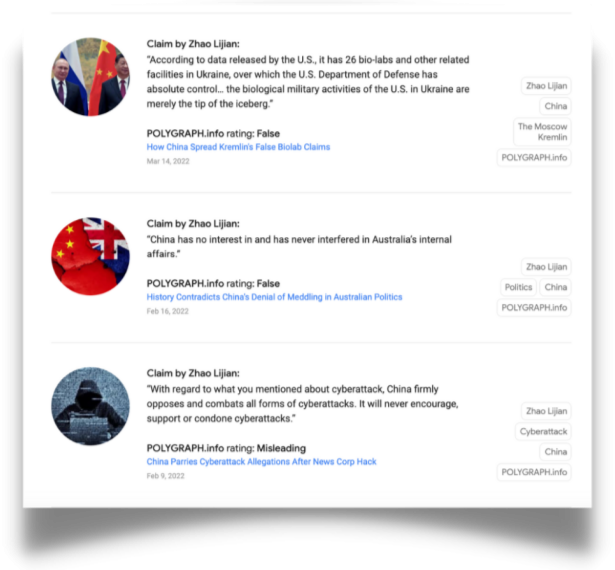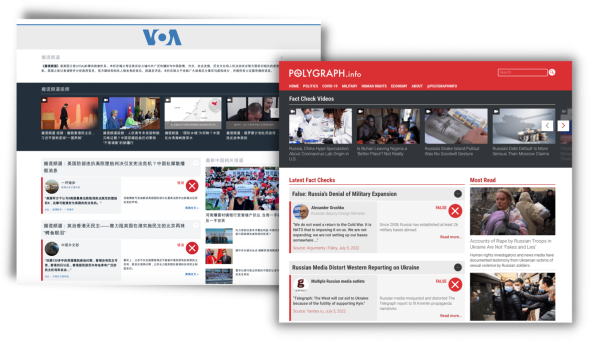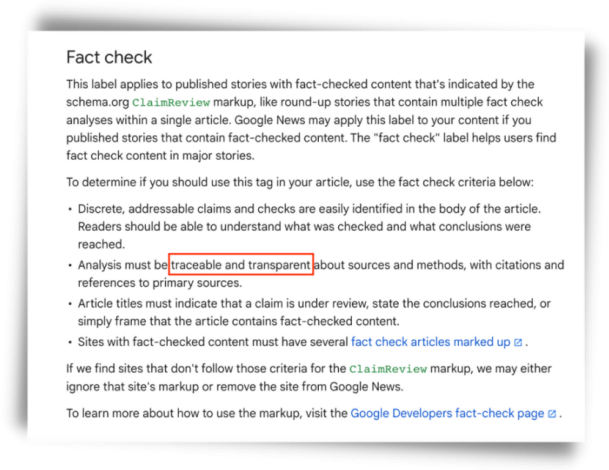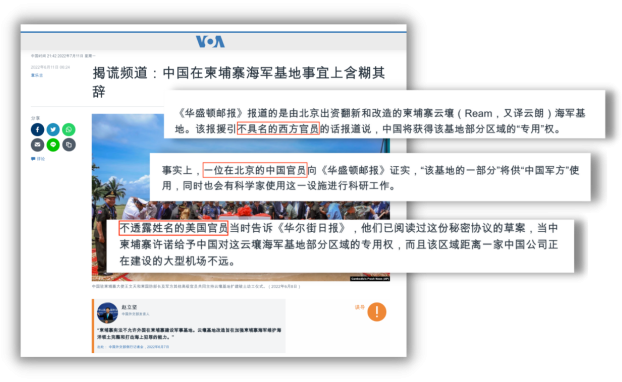
As more social media users spread increasing amounts of news and information about China, "China" has become one of the most searched topics on Google Fact Check Explorer. However, investigators recently found out almost all the "fact check" results of the Chinese Foreign Ministry spokespersons’ remarks are marked "fake" on Google.
Questions thus arise: Are the rating results credible? What are the sources of these fact checks? Why are they targeting Chinese Foreign Ministry?

Fact check results of Chinese Foreign Ministry Spokespersons’ remarks on Google
Unreliable content can obtain Google’s “Fact Check” label
As shown on the results page of Google Fact Check Explorer, the main sources of the “fact checks” on Chinese Foreign Ministry are the Fact Check column of Voice of America (VOA) Chinese and POLYGRAPH.info, a fact-checking website produced by VOA.

Fact Check column of VOA Chinese (left) and POLYGRAPH.info (right)
According to Google Fact Check Markup regulations, "Analysis must be traceable and transparent about sources and methods, with citations and references to primary sources" if a “Fact Check” tag is added to an article.

Google Fact Check markup regulations
Are VOA’s sources of “fact-checking” reports traceable and transparent?
For example, the article "Fact Check: China fudges on access to Cambodian naval base" from VOA Chinese refutes Chinese Foreign Ministry spokesperson Zhao Lijian’s remarks, claiming China has signed a secret agreement with Cambodia on the exclusive rights to the Ream Naval Base. The key argument is based on the words of some anonymous Western officials and "a Chinese official in Beijing" quoted in the Washington Post, as well as claims of anonymous "US and allied officials" in the Wall Street Journal.

The VOA Chinese article on China’s access to Cambodian naval base
The anonymous sources are unreliable and may be fabricated or misinterpreted by the author since it is difficult to verify. But the VOA report still successfully obtained Google’s “Fact Check” tag with such untraceable and nontransparent sources.
Google Fact Check is tainted by bias and propaganda
Harvey Dzodin, senior fellow of the Center for China and Globalization and former vice president of ABC Television in New York, told GDToday that to ensure accuracy, the media providing fact-checking content should be unbiased and conflict-of-interest free.
Does websites with Google’s “Fact Check” tag such as VOA Chinese and POLYGRAPH.info meet these conditions?
According to public information, VOA is supervised by the US Agency for Global Media (USAGM) and funded by the US government. It has long been criticized for being the mouthpiece of the US government.
Furthermore, the United States Innovation and Competition Act of 2021 and the America COMPETES Act of 2022 passed by the US Senate and the US House of Representatives respectively tries to further fund USAGM and affiliate Federal entities including the VOA concocting reports against China, which is detailed under a section titled "Supporting Independent Media and Countering Disinformation" in both acts.
“VOA has been turned from a news source to a biased propaganda tool,” Dzodin said. Apparently, VOA and similar media can target any government, institute or people as long as the US government needs, and China now is their focus. Even so, VOA’s “fact-checking” reports on China with its bias-tainted content are still labeled “Fact Check” on Google.
Should Google be responsible for verifying content with “Fact Check” tag?
Though Google claims that Fact Check Explorer is designed to allow users to easily browse and search for fact checks, the browser has currently become a new dissemination channel for VOA's propaganda reports.
In fact, no matter whether the content is accurate or not, as long as its publisher is “algorithmically determined to be an authoritative source of information”, it can be qualified for Google Fact Check feature, according to Jigsaw Product Manager Justin Kosslyn. “And there may be search result pages where different publishers checked the same claim and reached different conclusions,” he said. That means there may be two completely opposite fact-checking results for one claim on Google Fact Check Explorer.
As one of the world’s largest search engines, is it Google’s obligation to verify fact-checking content and publish the accurate ones?
According to Section 230 of the Telecommunications Act of 1996, Google as a provider of "interactive computer services" cannot "be treated as the publisher or speaker of any information provided by another information content provider", thus having no legal responsibility to verify facts.

Excerpt from Section 230 of the Telecommunications Act of 1996
"That said, on controversial issues of public importance like Sino-US relations, abortion or gun control, I personally believe that Google and similar companies have a moral obligation to society and their users to not publish false, misleading or deceptive information, but the debate about this is ongoing and unresolved," Dzodin said.
If content on Google’s Fact Check Explorer can be propaganda and lies, then the “Fact Check” label is never a proof of checked facts but a joke.
Co-presented by GDToday and School of Journalism and Communication, Jinan University
Authors | Lydia Liu, Edward (intern)
Investigators | Sun Yongle, Zhang Xiao
Poster designers | Mia, You Baoyi (intern)
Editors | Wing, Ma Liming, Keane, Steven, Jerry
















